UPRN for doctors- what doctors have to say?
M3 India Newsdesk Nov 22, 2017
We conducted an online survey and invited responses from Indian doctors to understand their sentiments about the MCI's decision on implementation of UPRN for all doctors, here are the results.

In a landmark step, Medical Council of India (MCI) has decided to bring all medical practitioners in the country under a single digital system by issuing each of them a Unique Permanent Registration Number (UPRN). We conducted an online survey and invited responses from Indian doctors to understand their sentiments about this move.
Methodology
The survey carried a few simple and direct questions for the Indian doctor community. The doctors were requested to respond voluntarily over a period of 2 weeks. A total of 108 doctors responded to the online questionnaire.
Demographics of the respondents
- The respondents were split equally between Metro and Non-Metro cities
- Nearly 50% of respondents were in the age bracket of 30-39 years, 30% were more than 40 years in age
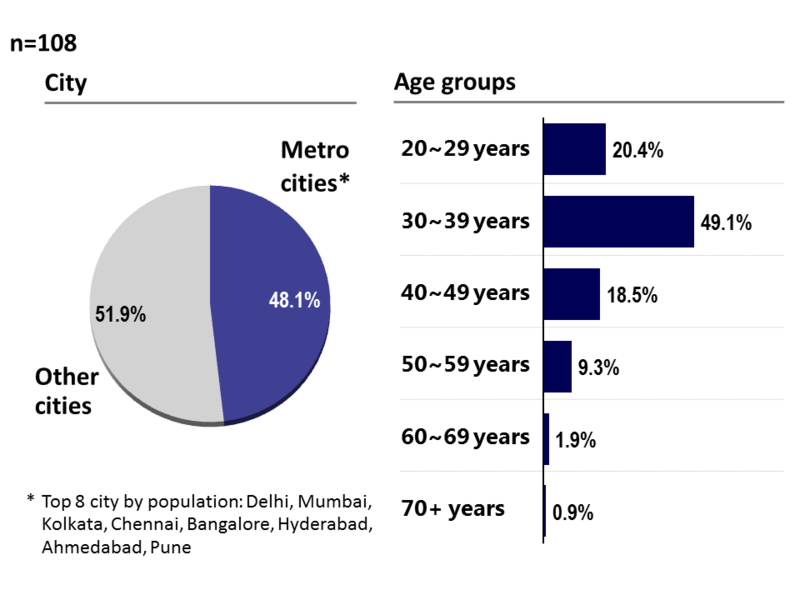
Survey Summary
The doctors, by and large, welcome the idea of UPRN.
About 63% of the doctors agreed to this proposed shift by MCI.
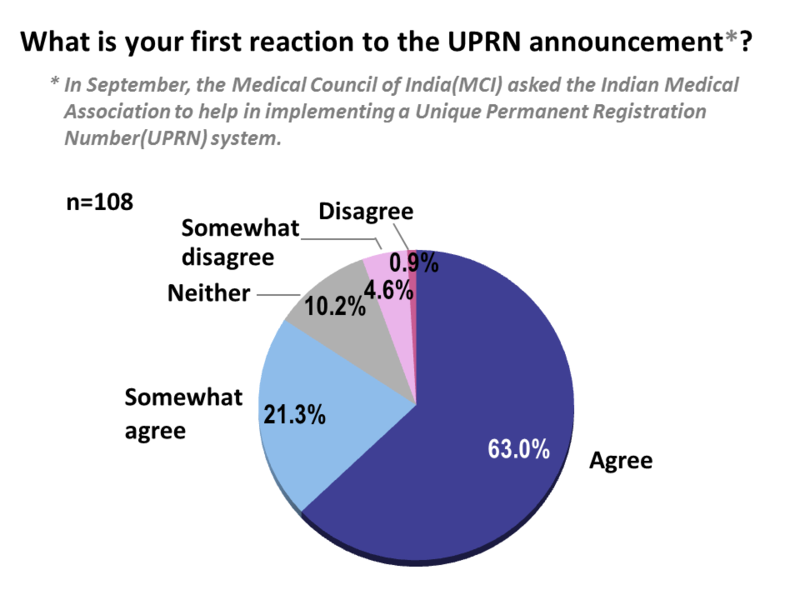
When the doctors were asked to choose the anticipated benefits of implementing UPRN, the 2 most popular benefits were:
1. 86% Doctors picked single registration to practice across multiple states.
2. by 79% of the doctors think that the implementation of UPRN would help in curbing the quack practice by identifying fake doctors and eliminate them from the system.
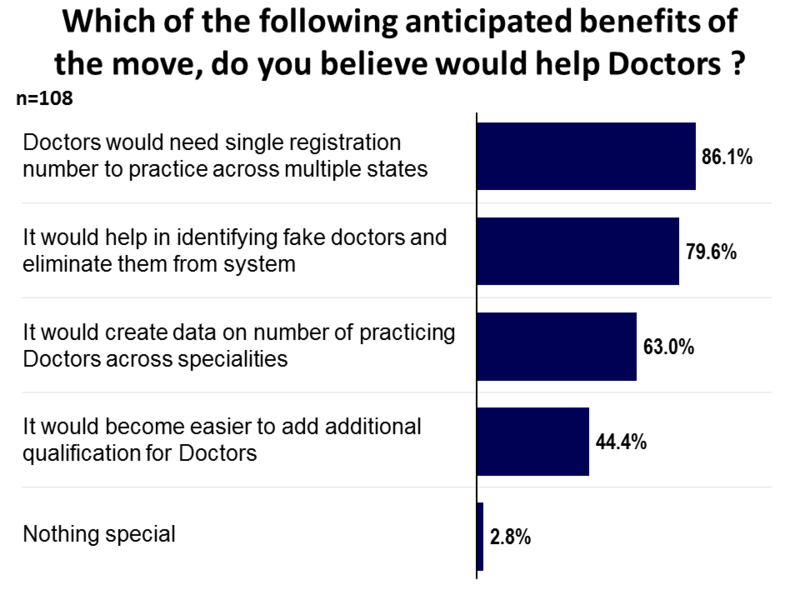
Other prominent reasons picked by doctors included:
(i) the move would help to create a centralised healthcare database by accumulating data on the number of practising doctors across specialities.
(ii) with the implementation of UPRN it would become easier for doctors to add an additional qualification.
Any concerns with the implementation?
When the doctors were asked if they could identify any potential issues with this new system implementation, more than 80% of the doctors replied in negative.” I do not see any problem for a genuine doctor and it should be made compulsory for every doctor to use this number, and any prescription or advice without number should be made invalid, thereby all quacks will be eliminated from system”, said a doctor from Bengaluru(30-39 y, surgical oncology).
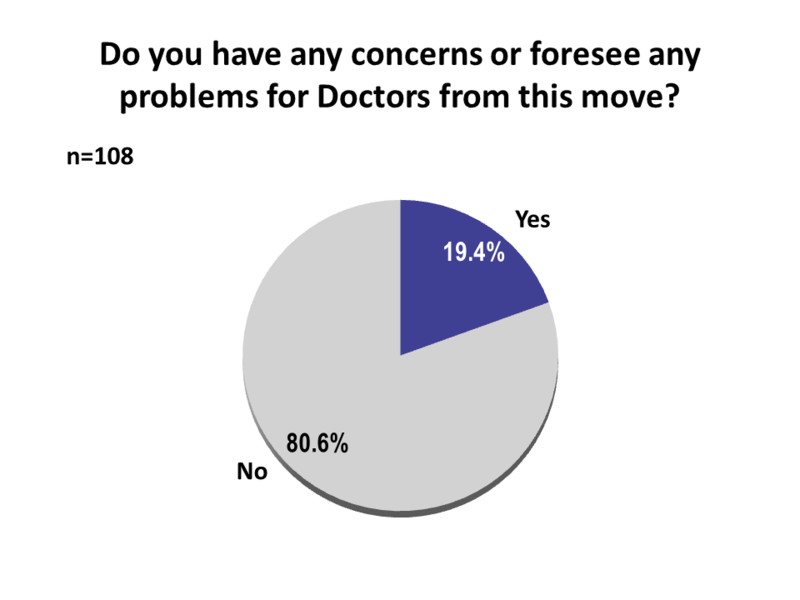
However, a small number of doctors (n=21) expressed concern about the implementation of the unique permanent number of the doctors.
A young doctor (30-39 y) from Ahmedabad working in the field of critical care medicine responded ,"Charging separately a hefty fee for registration again is a loot.”
Another doctor practicing general medicine in Gujarat cited registration expenses as “hassle”.
Yet another young doctor(20-29 y) from ob & gynaecology field responded, “More registration, the more money we have to spend. As it is we have spent a lot on doing registrations at every step of gaining degrees.”
A doctor from Bhopal (30-39 y, paed & neonatology)expressed concern about facing “Unnecessary documentation and harassment” in obtaining the new UPRN. Similar sentiments were expressed by another doctor from Gujrat (30-39 y, medical oncology) who proposed, “only single system/institution for registration not multiple. And convert to UPRN for free as most doctors already have paid to get their state / MCI registration.” A doctor from Bengaluru (40-49 y, surgical oncology) expressed that if the process was “complicated, many may not comply”.
How soon are the doctors willing to make the shift?
The final question of the survey attempted to understand how soon the doctors would like to make the shift to UPRN.The results from the data gathered were a “mixed bag.”
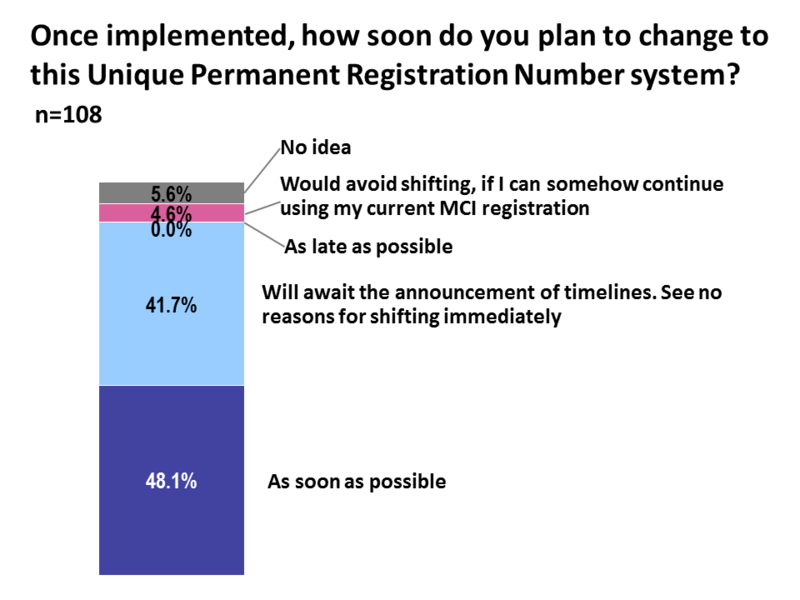
Among all the doctors surveyed, almost half of the doctors(n=48) responded that they would like to make the shift “ as soon as possible”, while the other half of the respondents (n=40) did not see the need to switch immediately and said that they would wait for the announcement of timelines of implementation before shifting.
Disclaimer
We have presented the data and facts as they are without generalizing the results as a reflection of the views of entire Indian doctor population. The demographic profile of the survey participants [shown above] may differ from the population of all Indian Doctors. Also, limiting the sample to the Internet channel only may introduce bias in the results. We also urge that the findings should not be interpreted as implying cause and effect.
-
Exclusive Write-ups & Webinars by KOLs
-
Daily Quiz by specialty
-
Paid Market Research Surveys
-
Case discussions, News & Journals' summaries